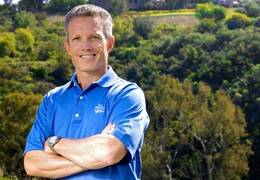Grateful Patient Thanks Scripps Clinic Doctors for Exceptional Care
Scripps patient Gordon Cooke survived a hemangioblastoma thanks to expert neuroscience team

Honoring the care he received, Gordon Cooke and his wife are supporters of Scripps Clinic.
When Gordon Cooke began experiencing headaches and sleepless nights in 2005, he first thought it was stress related. He had just started a new job as the membership director at The Bridges Club in Rancho Santa Fe. But, he soon realized that his symptoms could be more serious.
As the headaches continued, his wife, Julie, urged him to see his Scripps family practitioner, Merritt Hougen, MD. He was referred to Scripps Clinic otolaryngologist, John Saad, MD, and John Romine, MD, head of the division of neurology at Scripps Clinic.
A magnetic resonance imaging (MRI) was scheduled to get a clearer, more detailed picture of Gordon’s brain.
“When I was called in to discuss the results, I’ll never forget looking at the illuminated X-ray and the large white mass that it showed at the base of my skull,” says Gordon.
Hemangioblastoma: requiring a delicate procedure
Gordon had a hemangioblastoma, an uncommon benign tumor that was on top of the spinal cord and attached to the brain stem.
The next day Gordon and his wife met with Christopher Uchiyama, MD, head of the division of neurosurgery at Scripps Clinic. Dr. Uchiyama said surgery was needed to remove the tumor and recommended Scripps Clinic neurosurgeon Faith Barnett, MD.
Faith was exactly what — and who — Gordon needed at this time and an appointment was scheduled with Dr. Barnett the next day.
“It was pretty incredible,” he says. “Even though she had family in town from the East Coast and it was her day off, Dr. Barnett took the time to meet with us. For more than two hours we planned the next steps.”
Surgery began three weeks later at 5:30 a.m. on St. Patrick’s Day. The extremely delicate procedure was expected to take four hours, but lasted more than 12.
Return to an active lifestyle and philanthropy
The surgery was a success and Gordon’s tumor was removed. About a week later, he endured a second operation to relieve pressure inside the skull, caused by too much cerebrospinal fluid on the brain. A shunt was inserted to drain the fluid.
“I couldn’t have asked for more compassionate care,” says Gordon. “The skill and dedication of my surgeons were remarkable.”
Today, Gordon enjoys an active lifestyle and continues to support lifesaving care at Scripps. In addition to making ongoing philanthropic contributions, he serves as a member of the Scripps Clinic’s community advisory board and is co-chair of the 42nd Annual Scripps Clinic Invitational Dinner and Golf Tournament on Oct. 21 and 22, 2010.
“I owe my life to Scripps and I want to ensure that our community continues to have access to the best physicians and latest medical technology,” say Gordon.